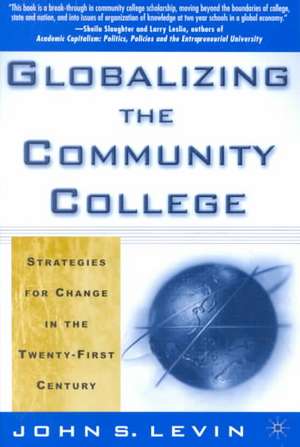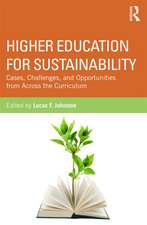Globalizing the Community College: Strategies for Change in the Twenty-First Century
Autor J. Levinen Limba Engleză Paperback – 5 apr 2002
| Toate formatele și edițiile | Preț | Express |
|---|---|---|
| Paperback (2) | 299.09 lei 3-5 săpt. | |
| Palgrave Macmillan US – 8 noi 2015 | 299.09 lei 3-5 săpt. | |
| Palgrave Macmillan US – 5 apr 2002 | 301.10 lei 3-5 săpt. | |
| Hardback (1) | 304.83 lei 3-5 săpt. | |
| Palgrave Macmillan US – 9 mai 2001 | 304.83 lei 3-5 săpt. |
Preț: 301.10 lei
Nou
Puncte Express: 452
Preț estimativ în valută:
57.61€ • 60.32$ • 47.67£
57.61€ • 60.32$ • 47.67£
Carte disponibilă
Livrare economică 17-31 martie
Preluare comenzi: 021 569.72.76
Specificații
ISBN-13: 9780312295950
ISBN-10: 0312295952
Pagini: 272
Ilustrații: XXIII, 248 p.
Dimensiuni: 140 x 216 x 18 mm
Greutate: 0.36 kg
Ediția:2001
Editura: Palgrave Macmillan US
Colecția Palgrave Macmillan
Locul publicării:New York, United States
ISBN-10: 0312295952
Pagini: 272
Ilustrații: XXIII, 248 p.
Dimensiuni: 140 x 216 x 18 mm
Greutate: 0.36 kg
Ediția:2001
Editura: Palgrave Macmillan US
Colecția Palgrave Macmillan
Locul publicării:New York, United States
Cuprins
Introduction Globalization and the community college The Cases: Seven Colleges in Two Nations The Domains of Globalization: The Economic Domain, the Cultural Domain The Information Domain The Domain of Politics The Process of Globalization What Remains Behind: The Community College in the 21st Century
Recenzii
'As it is thought of primarily as a local institution, one might not think that the community college would be affected significantly by globalization. However, in a path breaking study in two countries, Professor Levin shows that the community college has been affected in profound and diverse ways by the forces of globalization. In addition to dissecting the impacts of globalization, this book also provides such valuable insights into the organizational dynamics of community colleges that it is a must read for anyone interested in the management of community colleges.' - Michael L. Skolnik
The William G. Davis Chair in Community College Leadership, University of Toronto
'As John Levin demonstrates, globalization and academic capitalism are as pervasive in community colleges as in universities, and the two are re-shaping the mission of the community college as well as the opportunities available to students. Community colleges are entrepreneurial actors on a global stage, trading in international students, marketers of global educational products, and markets for multinational corporations. This book is a break-through in community college scholarship, moving beyond the boundaries of college, state and nation, and into issues of organization of knowledge at two year schools in a global economy.' - Sheila Slaughter and Larry Leslie, authors of Academic Capitalism: Politics, Policies and the Entrepreneurial University
'Levin's design and approachare sound and sufficiently documented to lend support to the findings in this book.' - Educational Researcher
'...among those who care about the role and future of community colleges, Levin's work belongs on your shelf.' - Chad M. Hanson, The Journal of Higher Education
'...an important work...' - Susan Salvador, Journal of College Student Development
The William G. Davis Chair in Community College Leadership, University of Toronto
'As John Levin demonstrates, globalization and academic capitalism are as pervasive in community colleges as in universities, and the two are re-shaping the mission of the community college as well as the opportunities available to students. Community colleges are entrepreneurial actors on a global stage, trading in international students, marketers of global educational products, and markets for multinational corporations. This book is a break-through in community college scholarship, moving beyond the boundaries of college, state and nation, and into issues of organization of knowledge at two year schools in a global economy.' - Sheila Slaughter and Larry Leslie, authors of Academic Capitalism: Politics, Policies and the Entrepreneurial University
'Levin's design and approachare sound and sufficiently documented to lend support to the findings in this book.' - Educational Researcher
'...among those who care about the role and future of community colleges, Levin's work belongs on your shelf.' - Chad M. Hanson, The Journal of Higher Education
'...an important work...' - Susan Salvador, Journal of College Student Development
Notă biografică
JOHN S. LEVIN is a professor of higher education in the Center for the Study of Higher Education at the University of Arizona. He is a former community college administrator and instructor. He has published widely both in the U.S. and Canada, addressing topics such as the presidency, governance, management, leadership, and organizational change. In 2000, the Canadian Society for the Study of Higher Education presented him with the Research Award for his work on Canadian higher education.
















